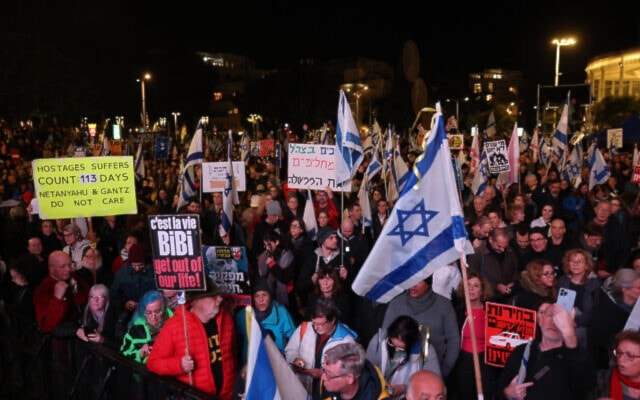Divisions in 'Israel' over Gaza war prompt election demands petition
Internal divisions within "Israel" have resurfaced, prompting hundreds of family members of Israelis killed on October 7 to launch a petition demanding elections.
-

Israeli settlers' placards during a rally in “Tel Aviv” on January 27, 2024, demanding the government's resignation and early elections, amid the ongoing genocide against Palestinians in Gaza. (AFP)
A new indication of a major division in "Israel's" war leadership has surfaced, after some 300 Israeli family members of those killed on October 7 and the subsequent war prepared a petition advocating for early elections.
A petition titled "October 7 Families Call for Elections," initiated by 310 family members of Israelis killed on October 7, emphasized that “only an elected government with a broad mandate will be able to set us on a new path.”
Taking a swing at Netanyahu, one of the family members of an Israeli killed on October 7 said, “Whoever is at the head of the country is responsible. This failure could also have been prevented. This government and its leader need to be replaced. Those who failed cannot fix it.”
This comes shortly after dozens of Israelis, including families of Israeli captives, protested last Saturday outside the Israeli Prime Minister's residence in occupied Qisarya, urging him not to "miss an opportunity" to bring back the captives.
Read next: New Israeli witness affirms IOF tanks killed settlers on October 7
Netanyahu popularity in decline on all levels, poll shows
A recent poll conducted by Israeli Channel 13 sheds light on the current preferences for the leadership of the Israeli regime, and incumbent Prime Minister Benjamin Netanyahu seems to be hitting absolute rock bottom at a time of war.
The survey, conducted among a diverse cross-section of Israeli settlers, indicates that if elections were held today, former Israeli occupation forces chief of staff Gadi Eisenkot would garner 45% of the vote, while Netanyahu trails with 32%.
In a hypothetical face-off between opposition leader Benny Gantz and Netanyahu, Gantz leads with 48%, leaving Netanyahu at 30%.
Similarly, if the competition were between former Prime Minister Yair Lapid and Netanyahu, Lapid would garner 36% of the vote compared to Netanyahu's 41%.
When asked about the motivations behind Netanyahu's decisions during times of war, 53% of respondents believe personal motives and issues guide his actions, while 33% perceive that the interests of the Israeli occupation are the driving force behind his decision-making process.
The survey delved into public opinion on a potential peace deal involving a cessation of hostilities and a prisoner exchange. Results show that 35% of respondents support such a deal, while 46% oppose it. A notable 19% remain undecided on the matter.
Read next: Leaked exchange from closed Israeli meeting highlights stark division

 3 Min Read
3 Min Read










